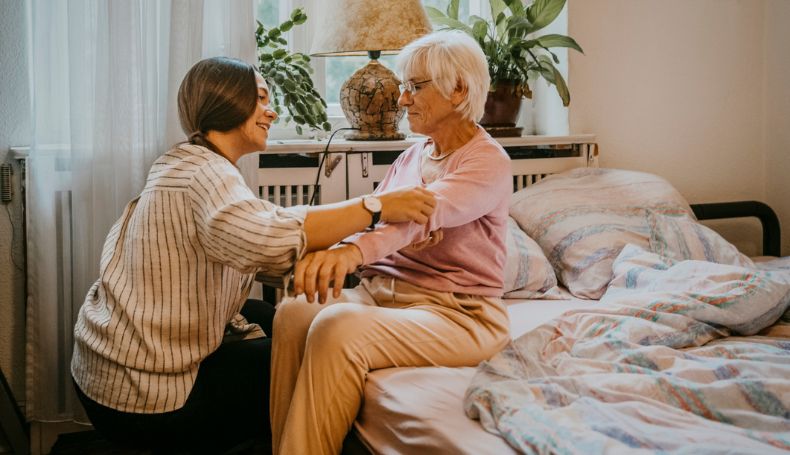Jargon Buster: Cracking the code of caregiving programs

A
Activity of Daily Living (ADL): There are six main activities of daily living: eating, dressing, bathing, mobility, toileting and continence. Family caregivers typically help with these personal care tasks.
Acute care: This type of care is provided for a severe but brief episode of illness, trauma or recovery. It usually takes place in a facility such as a hospital.
Adaptive Equipment: Adaptive equipment includes any tools or devices that help a person to live independently.
B
Background Check: Used to determine employment eligibility and ensure potential caregivers meet the requirements to provide care. It includes making sure a person is who they claim to be and finding out if that person has a criminal record.
Budget Authority: In self-direction, this empowers a care recipient to have control over how funds are spent on care and necessities.
C
Case Manager: A case manager (also known as a service coordinator or service manager) works with both the care recipient and the caregiver to understand needs and establish long-term goals. Case managers offer guidance and resources that help care recipients live comfortably while their caregivers provide their care.
Continence: Continence is the ability to control bowel and bladder function.
D
Dependent: A dependent is someone who relies on another person for support and care, especially for things like food, shelter, clothing and other basic needs. It can be a child, a senior parent, or someone with a disability who needs extra help and can’t fully take care of themselves.
Dual Eligible: When someone qualifies for both Medicaid and Medicare coverage, they’re considered dual eligible. This means they have access to the services provided under both programs, which gives them a wider range of resources so they can receive proper care.
E
Employer: In Medicaid waiver programs that allow a person to hire their own caregivers, the employer is the person who is responsible for hiring, training and potentially firing care workers. This person is responsible for approving and submitting timesheets and explaining how services should be provided. The employer is usually the member or their representative.
F
Family and Medical Leave Act (FMLA): Through the Family and Medical Leave Act, a federal labor law, caregivers can take time off to care for their loved ones without losing their job or other benefits.
Family Caregiver: Any relative, partner, friend or neighbor who has a significant personal relationship with and provides a broad range of assistance for an adult with a chronic or disabling condition.
G
Guardianship: Guardianship is a court-approved legal relationship that gives someone legal authority over another person when that person can’t make safe and sound decisions about themselves or their property.
H
Healthcare Power of Attorney: A legal document that allows your loved one to choose someone they trust to make medical decisions on their behalf if they’re unable to do so themselves.
Health Care Proxy: This chosen person becomes the care recipient’s voice in medical matters, making decisions about treatments, doctors and other health care choices based on what their loved one would want.
Homecare Agencies: Licensed and regulated home care agencies recruit, screen and hire workers to provide care in the home such as light housekeeping, meal preparation, laundry, shopping and other tasks. Medicare doesn’t cover these services, but some states’ Medicaid programs help qualified adults with low income pay for them.
Home Health Agency: A company or nonprofit, often certified by Medicare, that provides health-related services such as nursing, personal care, social work, or occupational, physical or speech therapy in a client’s home.
I
Incontinence: Inability of a person’s body to control bowel or bladder functions.
Instrumental Activity of Daily Living (IADL): Similar to ADLs (activities of daily living), instrumental activities of daily living are activities that are important to daily living. They can include meal prep, grocery shopping, transportation, budgeting, and engaging in community events.
L
Long-term care/long-term support services (LTSS): Long-term care or long-term support services (LTSS) are given to people who need ongoing help with activities of daily living (ADLs) or instrumental activities of daily living (IADLs) because of chronic illness, disability or aging.
N
Natural Supports: Natural supports are help and care that someone gets at home from their friends, family or community for free. This can include help that family members provide, like basic personal care, transportation, attending social or recreational activities, laundry, meal preparation, or grocery shopping. It can also include supports that friends, neighbors and others in the community provide. For some Medicaid waiver programs, the person receiving services must first turn to natural supports for care.
Nursing Home: A public or private residential facility that provides a high level of long-term personal or medical care for chronically ill, disabled and older people who are unable to live independently without round-the-clock care.
P
Personal Care Assistant (PCA): A personal care assistant (PCA) is someone who helps a person maintain their independence and quality of life by assisting them with ADLs, IADLs, and other tasks they find challenging.
Q
Qualified Professional (QP): A qualified professional oversees and supervises personal care assistance (PCA) services and the staff who deliver those services.
R
Respite: Short-term or temporary care of a sick, disabled or older person for a few hours, days or weeks, designed to provide relief to the family caregiver.
S
Service Agreement (SA): A written document that outlines which services will be provided, how often they’ll be provided, and how much they’ll cost.

Find Programs That Pay
Can I get paid to be a family caregiver? Let’s find out if there are programs that might provide compensation.
Find Programs that Pay